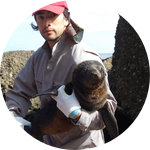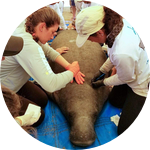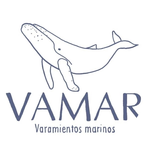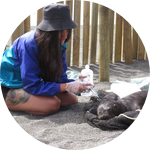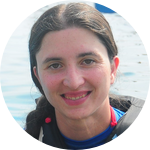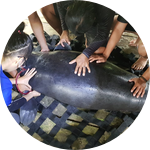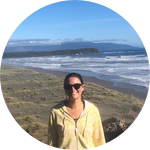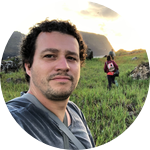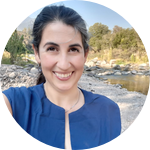About This Project
Every year in Cobquecura hundreds of South American sea lion's pups (SASLps) strand for natural causes. The breeding colony is less than 1 km away from a populated coastal area. Moreover, strandings occur at the peak of the summer and the touristic season. Consequently, stranded pups are in contact with humans and domestic animals; with potential trans-species dissemination of pathogens. Our project aims under the One Health approach to investigate pathogens on SASLps and possible zoonosis.
Ask the Scientists
Join The DiscussionWhat is the context of this research?
A large, highly dense, breeding colony for South American sea lions is located in Cobquecura, Ñuble, Chile, counting up to 3,900 individuals. This is a protected area which is considered a natural monument and an important touristic point to visit. The rookery is located less than a kilometer away from the main beach. Every year hundreds of pups strand on the beach mainly due to surges and bad weather, where they get in contact with many people and usually their domestic pets. This interaction between humans, pets, and wildlife could be a risk to public health and to the South American sea lion population since there could be inter-species and zoonotic disease transmission.
What is the significance of this project?
To understand the consequences of South American sea lions, humans, and domestic animals interaction it is essential to record data such as the diversity of pathogens present in South American sea lion pups, their general health condition, environmental influences, and the presence of risk factors for stranded pups. Furthermore, relevant data could be obtained to determine if mass strandings represent a risk to public health and to the South American sea lion population of Cobquecura.
Currently, there is no research on the potential impacts that the mass strandings commonly occurring in Cobquecura could have on public health and on the sea lion population.
What are the goals of the project?
A clinical examination will be performed in every stranded sea lion pup for general health assessment. Blood samples, nasal and rectal swabs, and fecal samples will be collected, to describe the diversity and epidemiology of selected respiratory and digestive pathogens in South American sea lions. These data will be useful to determine the presence and prevalence of zoonotic and relevant pathogens, allowing to investigate the correlation between the environmental conditions, the diversity of pathogens, and the general health of the sea lion pups, and it will be possible to determine if there is a risk to public health and to the South American sea lion population of Cobquecura. Finally, the results obtained will be published to share the knowledge with the community.
Budget
The proposed budget will allow us to complete most of the proposal. We will be able to go to the field and stay on-site for the whole "stranding season" to then process samples to determine the overall health of stranded South American sea lions' pups and the prevalence of selected pathogens in this population.
Endorsed by
 Project Timeline
Project Timeline
Fieldwork in Cobquecura, Chile will be carried out for health assessment and sample collectionof stranded sea lion's pups. The team will stay on-site for "stranding season". Sampling processing will be complete during the first semester of 2022. Results would be presented at national and international meetings and published. Outreach material and workshops for stakeholders will be carried out to promote the One Health concept and conservation measurmentes.
May 31, 2021
Project Launched
Jul 01, 2021
Project launch and being of the preparation for fieldwork
Dec 26, 2021
Start of the field season, we will travel to Cobquecura, Ñuble Region, Chile
Feb 28, 2022
End of health assessments and sample collection. Beginning of laboratory work
Mar 27, 2022
Preparation of educational material for the community and explaining the study carried out
Meet the Team
Affiliates
Affiliates
Affiliates
Affiliates
Team Bio
We are a team of veterinarians passionate about wildlife and marine sciences, all alumni from the Universidad de Chile, all with professional and/or graduate studies in Chile or abroad and experience in wild and marine mammals medicine. Most of the team worked in Cobquecura the past summer and since then we have been meeting regularly to search for funding opportunities to carry out health assessments of sea lions’ pups and under the One Health approach learn about pathogens on this colony.
Sofía Navarrete
Since childhood I have had a great passion for nature and science, I always wanted to be a veterinarian. During my first year at university, I decided to dedicate my life to conserving nature and to use all my knowledge, time, and resources to help the planet. I feel a deep connection with nature and my life is absolutely linked to it, all time I am thinking about how I can contribute to its protection and I have infinite ideas and projects in my mind that I hope to fulfill in a not too distant future. I am a veterinarian student close to graduation from the Universidad de Chile and I want to continue with postgraduate studies. My academic experience has been closely related to wildlife, I have worked in research projects, I have developed in the field of rehabilitation of marine and terrestrial animals, where I have strengthened my knowledge in management and medicine wildlife. The rehabilitation and rescue of marine animals is one of my great passions, which is why I have been working voluntarily with South American sea lions for two years. A few months ago, together with a great team, we managed to create the Foundation for the Conservation of Nature, to actively protect the ecosystems of our country, share our knowledge and bring communities closer to science.
Galaxia Cortés Hinojosa
A veterinarian graduate from the Universidad de Chile with a master's in marine sciences and a Ph.D. under the Aquatic Animal Health program from The University of Florida. Galaxia has been working in the ecology of marine vertebrates since 2005 and in marine mammals pathogens discovery since 2010. Dr. Cortés-Hinojosa is currently an assistant professor of veterinary virology and zoological medicine at the Pontificia Universidad Católica de Chile, Chile. Her research focus is on pathogen surveillance and discovery in marine vertebrates, One Health, and Conservation Medicine. She has an ongoing project investigating the virus diversity in South American pinnipeds (Otaria Byronia and Arctocephalus australis) in remote locations with minimal anthropogenic intervention. The results obtained from the current proposal will be used to further understand the diversity of pathogens in South America pinniped populations and the effect of proximity to population areas on pathogens diversity as well as the zoonotic potential of the interaction of tourist with sea lion pups.
María Violeta Barrera N.
Veterinarian graduated from the University of Chile. After graduation, she worked on one largest South American fur seal breeding colonies. She completed a specialization in wildlife and conservation and since then has been working with terrestrial and aquatic wildlife in Chile and the Amazon. She is currently pursuing a Ph. D. degree with an emphasis in conservation medicine at the Pontificia Universidad Católica de Chile.
Josefina Gutierrez
Since I was very young I've had a passion for animals, that's why I decided to become a Vet. During my career, I have dedicated my life to treat and research marine mammal's health, which has to lead me to train in the area. In my master’s research project I worked with population genetics and disease ecology in one of the largest South American fur seal breeding colony and I have been working with otariids since 2008.
Pedro Jimenez Bluhm
Veterinarian graduated from the University of Chile and Ph.D. graduated from the University of Wisconsin-Madison. Founding member of the WISC-WDA Student Chapter (2014). Currently studying gene flow and evolution of avian influenza viruses in shorebirds in Chile. Actively researching topics of disease transmission at the animal-human interface.
Gemma Rojo Aravena
A veterinarian graduate from Universidad de Chile with a Ph.D. in "Ciencias Silvoagropecuarias y Veterinarias" (Ph.D. in Forestry, agricultural and Veterinarian Sciences). Gemma has been working with wildlife reservoirs for infectious diseases with a One Health approach, and currently is doing research on SARS-CoV-2 wildlife infections. Dr. Rojo is an assistant professor of veterinary zoology, ecology, and parasitology at Universidad de O'Higgins, San Fernando, Chile.
Lab Notes
Nothing posted yet.
Additional Information
Capture will be carried out following established protocols and samples will be paired with ongoing research projects whenever possible. South American sea lions' pups will be kept in the shade and repeatedly cooled with seawater to prevent hyperthermia and the examination and sampling will no take more than 15 minutes. Vital parameters, including respiratory rate, temperature, heart rate, and hemoglobin saturation via pulse oximetry will be monitored continuously. Pups will be manually restrained. For each animal captured, morphometric data will be collected (weight and total length), gender, photo records, and a complete clinical examination including blood work and clinical biochemistry will be performed. In addition, age will be estimated based on breeding peak, when the information is available. Blood will be drawn from the caudal gluteal vein of pups and put into EDTA, and plain (serum) vacutainer tubes. Plain tubes will be centrifuged in less than one hour after collection, serum and buffy coat will be collected independently. For the pathogen discovery nasal, and fecal swabs will be collected in duplicate to then be stored at -20C.
This project has the corresponding sampling permits from National Fisheries services (SUBPESCA, E-2021-102) and Ethical approval from the Pontificia Universidad Catolica de Chile (Acta_CA_1611930822836), as well as the support of the National Fisheries Services of Chile (Sernapesca). Additionally, this project would be supported by a complementary project Fondecyt 11200301 (Dr. Cortés-Hinojosa)
Project Backers
- 20Backers
- 26%Funded
- $1,081Total Donations
- $54.05Average Donation
